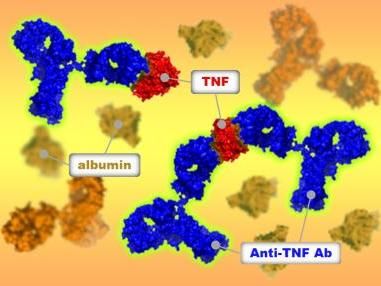New drug clears psoriasis in clinical trials
Advertisement
About 80 percent of patients with moderate to severe psoriasis saw their disease completely or almost completely cleared with a new drug called ixekizumab, according to three large, long-term clinical trials led by Northwestern Medicine.
"This group of studies not only shows very high and consistent levels of safety and efficacy, but also that the great majority of the responses persist at least 60 weeks," said Dr. Kenneth Gordon, a professor of dermatology at Northwestern University Feinberg School of Medicine and first author of the paper.
Affecting about 3 percent of the world's population, psoriasis is an immune-mediated inflammatory disease that causes itchy, dry and red skin. It is also associated with an increased risk for depression, heart disease and diabetes, among other conditions.
Ixekizumab works by neutralizing a pathway in the immune system known to promote psoriasis.
To test the drug's efficacy over time - and to help clinicians determine whether its benefits outweigh any risks - the three studies enrolled a total of 3,736 adult patients at more than 100 study sites in 21 countries. All participants had moderate to severe psoriasis, which is defined as covering 10 percent or more of the body. Patients were randomly assigned to receive injections of ixekizumab at various doses or a placebo over a period of more than a year.
The investigators assessed whether the drug reduced the severity of psoriasis symptoms compared to the placebo and evaluated safety by monitoring adverse events. By the 12th week, 76.4 to 81.8 percent of patients has their psoriasis classified as "clear" or "minimal" compared to 3.2% of patients on the placebo. By the 60th week, 68.7 to 78.3 percent of patients had maintained their improvement.
"Based on these findings, we expect that 80 percent of patients will have an extremely high response rate to ixekizumab, and about 40 percent will be completely cleared of psoriasis," Gordon said. "Ten years ago, we thought complete clearance of this disease was impossible. It wasn't something we would even try to do. Now with this drug, we're obtaining response levels higher than ever seen before."
Adverse events associated with ixekizumab included slightly higher rates of neutropenia (low white blood cell count), yeast infection and inflammatory bowel disease compared to the placebo. The safety of therapy longer than 60 weeks will need to be monitored in the future.
The drug has been approved by the Food and Drug Administration since the trials were completed.
Original publication
Other news from the department science
Most read news
More news from our other portals
See the theme worlds for related content
Topic world Antibodies
Antibodies are specialized molecules of our immune system that can specifically recognize and neutralize pathogens or foreign substances. Antibody research in biotech and pharma has recognized this natural defense potential and is working intensively to make it therapeutically useful. From monoclonal antibodies used against cancer or autoimmune diseases to antibody-drug conjugates that specifically transport drugs to disease cells - the possibilities are enormous

Topic world Antibodies
Antibodies are specialized molecules of our immune system that can specifically recognize and neutralize pathogens or foreign substances. Antibody research in biotech and pharma has recognized this natural defense potential and is working intensively to make it therapeutically useful. From monoclonal antibodies used against cancer or autoimmune diseases to antibody-drug conjugates that specifically transport drugs to disease cells - the possibilities are enormous






















































